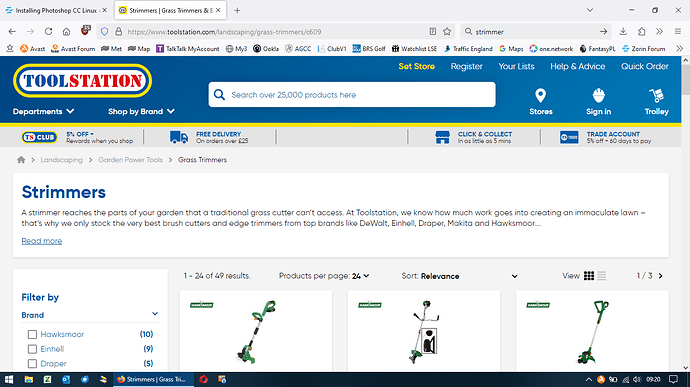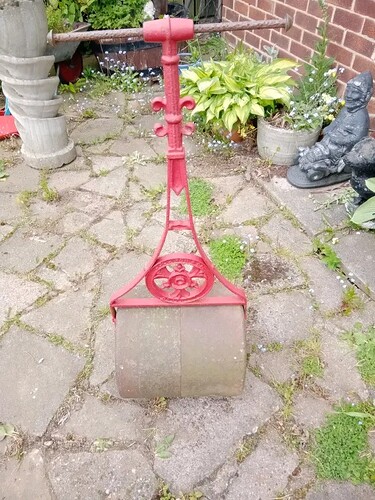I keep forgetting the cultural differences between our countries, when it comes to acronyms. LT is Lawn Tractor, GT is Garden Tractor, ZT is Zero Turn. These terms are actually coined by the manufacture's.
Older folks will call a string trimmer, a weed wacker. I think in Brittain and UK, you folks say Whipper Snipper, or Strimmer. Honestly, we could write a book on the cultural acronyms lol.
The only thing America uses KW for, is in electrical power plants, Kilowatt, Megawatt, Gigawatt. For decades our country has used Horse Power to rate an engines power. Then after a lawsuit happened a couple decades ago, our country started rating small enginses in CC's.
To anyone who is GenZ, that change won't matter or effect them. But to those of us who have actually lived awhile, that screws us up, because our brains got trained to say horse power, now we have to think of it in cubic centimeters.
The real problem, stems from the fact that the rest of the world uses the metric system, and America wanted to be different I guess, and came up with our own system, long before I was born.
Briggs and Stratten are a huge name in the US, as they used to be the industry leader in gasoline small engines. But like many companies who died in America, by not getting with the times, or treating the company as a hedge fund, they went under and declared chapter 11 bankruptcy.
This country imports far too many goods made in China, as China has pretty much has taken over the small engine market, and most of the good companies we had making stuff in our own country, are long gone. Honda was the latest on the chopping block, last year.
So the small engine world has been interesting to say the least, with all the corporate changes going on.
Thats awesome dude! I'm a hands on learner as well, as there is no better way to learn, then to get your hands dirty! I began my foyay into small engine education, when I took high school shop class. Back then, the school only had flat head engines to work on, but I learned a lot!
When it came time to get my certification, I was at a disadvantage, because I needed to further my education for overhead valve engines, since the were quickly becoming the new wave of the future. It was mostly written study, with a short bit of hands on education.
The great thing about battery, as long as the motor doesn't die, if its just a worn out battery, you just spend way too much, and replace it. The bad thing, that puts me out of a job. I'm already experiencing the shift, as more people are switching to battery.
Some still bring their battery mowers in for service, as the blade always needs sharpening, and most folks don't know how to properly sharpen a mower blade, so I make 25 bucks there, but you can't keep a shop open for that.
I barely made it through Covid, I ended up closing my shop, for which I thought was going to be permanent. However, as things started getting better, and people started leaving their homes again, I crawled out of unemployment for awhile just in time to re-open, an start working again.
Lots of businesses did experience a perma-death during the pandemic though, and never came back. As long as people still of gas powered machines that need serviced, then I still have a job.
And as much as they are pushing this battery stuff on us, there are still some machines that do absolutely terrible on battery, because they just don't last as long as a full tank of gas.
People up in northern climates, are learning that. As their battery operated snow blowers, run out of battery, before the job is done. Plus there's the issue with cost. You can buy a gasoline powered push mower for 200+ dollars, 400+ dollars for self propel.
A battery operated push mower, is closer to 350+ dollars, and a self propel mower is 500+ dollars. Then jump into lawn tractor or zero turn, now your looking at 3000 to 10,000 dollars. Most folks can't even afford it!
Thats why I don't have a battery operated mower yet. Having said that, I have a battery operated commercial Makita string trimmer, I coudn't afford the blower yet, so I didn't get that along with it. I also have a Milwaukee battery operated hedge trimmer.
And of course, all my shop tools are Milwaukee, as I switched to battery, and stopped using shop air, to run pneumatic impacts and ratchets. Now I just use shop air for inflating tires, or using the blow-gun tool.
Again, I think its really cool, that you've worked on some really neat cars, people pay a lot of money for the classics! And if you ever visited LA International Airport in California, you'll notice that they get a lot of classic cars, that rich people buy, and import here by plane. Some of those cars, still have the steering wheel on the right side lol.
The world is in a climate crisis indeed, just look what happened in LA California during winter time, half the dang city just burned down! I won't get into politics here, as that is against the forums guidelines. Just know, half the country is not happy it, and thats all I will say, so we move on...
Awesome! Glad you are liking it! Yeah, I pretty just use Gimp. But as you have seen, one of the wonderful things about Linux, is you can usually find several apps that do the same sort of thing, so if one doesn't work out, you can try another.
I want to thank you for taking the time to give Linux a real chance. Some folks, will try Linux for a day, and go back to Windows. And I thank you for just taking your time to learn it, and really give it a chance.
Also, thank you for the wonderful conversation, it was nice to talk shop with you for awhile.



